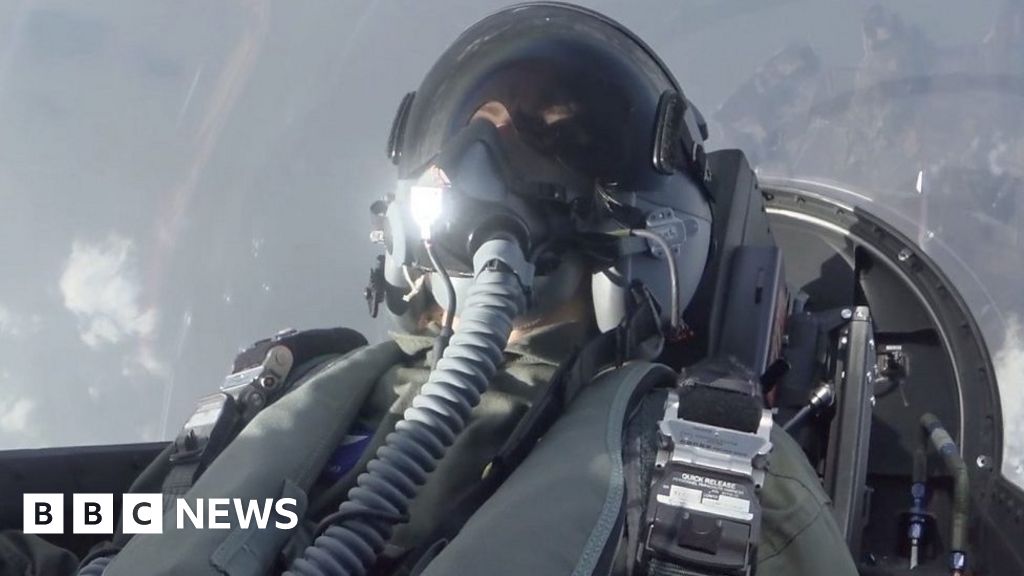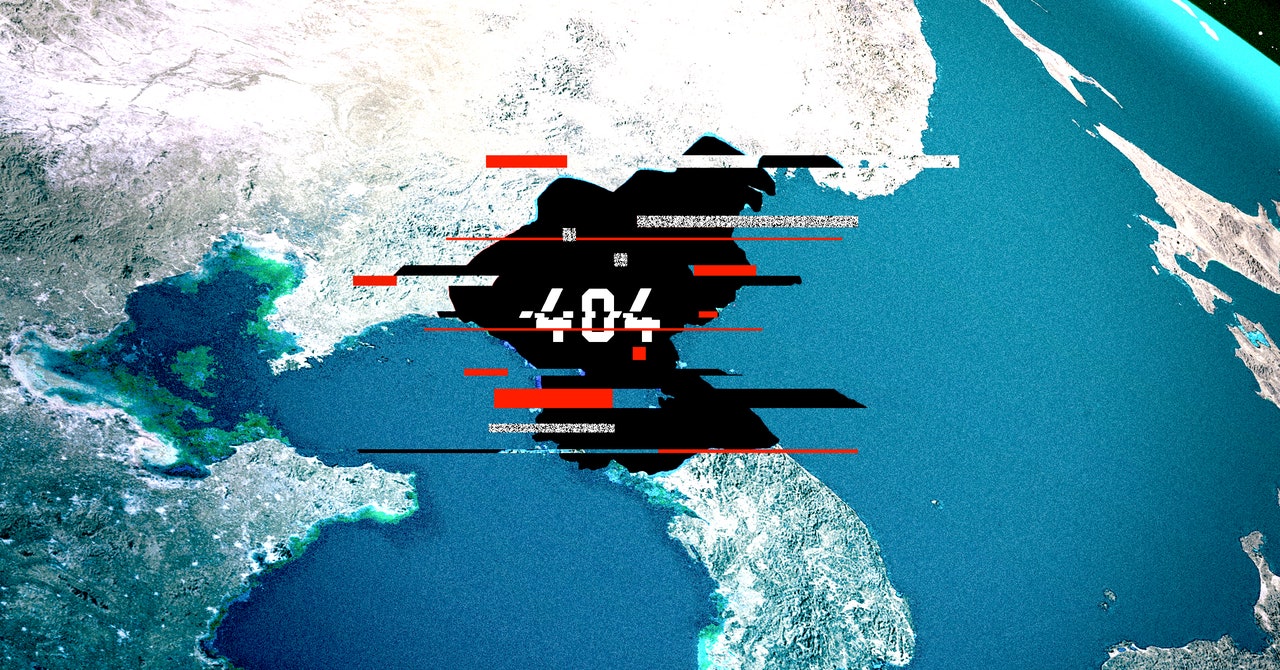
Watching North Korea from a fighter jet
BBC correspondent Laura Bicker reports from a supersonic fighter jet on South Korea’s drive to build up its own war machine.
Follow along with the video below to see how to install our site as a web app on your home screen.
Note: This feature may not be available in some browsers.

Thieves operating for the North Korean government made off with almost $400m in digicash last year in a concerted attack to steal and launder as much currency as they could.
A report from blockchain biz Chainalysis found that attackers were going after investment houses and currency exchanges in a bid to purloin funds and send them back to the Glorious Leader's coffers. They then use mixing software to make masses of micropayments to new wallets, before consolidating them all again into a new account and moving the funds.
Bitcoin used to be a top target but Ether is now the most stolen currency, say the researchers, accounting for 58 per cent of the funds filched. Bitcoin accounted for just 20 per cent, a fall of more than 50 per cent since 2019 - although part of the reason might be that they are now so valuable people are taking more care with them.
"These behaviors paint a portrait of a nation that supports cryptocurrency-enabled crime on a massive scale," the report finds. "Systematic and sophisticated, North Korea’s government — be it through the Lazarus Group or its other criminal syndicates — has cemented itself as an advanced persistent threat to the cryptocurrency industry in 2021."


 fb.watch
fb.watch
Sen verran monta ohjusta lauottu nyt lyhyen ajan sisään että Pkorea koittaa hädissään hakea jotain reaktiota länsimaista. Kaikki huomio on Ukrainassa, ja se ei ole hyvä heidän kannaltaan.MSN
www.msn.com
SEOUL, Jan 26 (Reuters) - North Korea's internet appears to have been hit by a second wave of outages in as many weeks, possibly caused by a distributed denial-of-service (DDoS) attack, researchers said on Wednesday.
The latest incident took place for about six hours on Wednesday morning local time, and came a day after North Korea conducted its fifth missile test this month.
Junade Ali, a cybersecurity researcher in Britain who monitors a range of different North Korean web and email servers, said that at the height of the apparent attack, all traffic to and from North Korea was taken down.
"When someone would try to connect to an IP address in North Korea, the internet would literally be unable to route their data into the country," he told Reuters.
Hours later, servers that handle email were accessible, but some individual web servers of institutions such as the Air Koryo airline, North Korea's ministry of foreign affairs, and Naenara, which is the official portal for the North Korean government, continued to experience stress and downtime.
Internet access is strictly limited in North Korea. It is not known how many people there have direct access to the global internet, but estimates generally place the figure at a small fraction of one percent of the population of about 25 million.
Seoul-based NK Pro, a news site that monitors North Korea, reported that log files and network records showed websites on North Korean web domains were largely unreachable because North Korea’s Domain Name System (DNS) stopped communicating the routes that data packets should take.
A similar incident was observed on Jan. 14, NK Pro reported.
The simultaneous nature of the server outages suggested a DDoS attack, in which hackers try to flood a network with unusually high volumes of data traffic in order to paralyse it, Ali said.
"It’s common for one server to go offline for some periods of time, but these incidents have seen all web properties go offline concurrently. It isn't common to see their entire internet dropped offline."
During the incidents, operational degradation would build up first with network timeouts, then individual servers going offline and then their key routers dropping off the internet, Ali said. "This indicates to me that this is the result of some form of network stress rather than something like a power cut."

For the past two weeks, observers of North Korea's strange and tightly restricted corner of the internet began to notice that the country seemed to be dealing with some serious connectivity problems. On several different days, practically all of its websites—the notoriously isolated nation only has a few dozen—intermittently dropped offline en masse, from the booking site for its Air Koryo airline to Naenara, a page that serves as the official portal for dictator Kim Jong-un's government. At least one of the central routers that allow access to the country's networks appeared at one point to be paralyzed, crippling the Hermit Kingdom's digital connections to the outside world.
Some North Korea watchers pointed out that the country had just carried out a series of missile tests, implying that a foreign government's hackers might have launched a cyberattack against the rogue state to tell it to stop saber-rattling.
But responsibility for North Korea's ongoing internet outages doesn't lie with US Cyber Command or any other state-sponsored hacking agency. In fact, it was the work of one American man in a T-shirt, pajama pants, and slippers, sitting in his living room night after night, watching Alien movies and eating spicy corn snacks—and periodically walking over to his home office to check on the progress of the programs he was running to disrupt the internet of an entire country.
Just over a year ago, an independent hacker who goes by the handle P4x was himself hacked by North Korean spies. P4x was just one victim of a hacking campaign that targeted Western security researchers with the apparent aim of stealing their hacking tools and details about software vulnerabilities. He says he managed to prevent those hackers from swiping anything of value from him. But he nonetheless felt deeply unnerved by state-sponsored hackers targeting him personally—and by the lack of any visible response from the US government.
So after a year of letting his resentment simmer, P4x has taken matters into his own hands. “It felt like the right thing to do here. If they don’t see we have teeth, it’s just going to keep coming,” says the hacker. (P4x spoke to WIRED and shared screen recordings to verify his responsibility for the attacks but declined to use his real name for fear of prosecution or retaliation.) “I want them to understand that if you come at us, it means some of your infrastructure is going down for a while.”
P4x says he's found numerous known but unpatched vulnerabilities in North Korean systems that have allowed him to singlehandedly launch “denial-of-service” attacks on the servers and routers the country's few internet-connected networks depend on. For the most part, he declined to publicly reveal those vulnerabilities, which he argues would help the North Korean government defend against his attacks. But he named, as an example, a known bug in the web server software NginX that mishandles certain HTTP headers, allowing the servers that run the software to be overwhelmed and knocked offline. He also alluded to finding “ancient” versions of the web server software Apache, and says he's started to examine North Korea's own national homebrew operating system, known as Red Star OS, which he described as an old and likely vulnerable version of Linux.
P4x says he has largely automated his attacks on the North Korean systems, periodically running scripts that enumerate which systems remain online and then launching exploits to take them down. “For me, this is like the size of a small-to-medium pentest,” P4x says, using the abbreviation for a “penetration test,” the sort of whitehat hacking he's carried out in the past to reveal vulnerabilities in a client's network. “It's pretty interesting how easy it was to actually have some effect in there.”

North Korea pressed ahead with the development of its nuclear and missile programs last year despite international sanctions, according to a confidential United Nations report seen by AFP on Saturday.
Pyongyang is under major sanctions over its weapons programs, including a ban on exports of coal, iron, lead, textiles, seafood and other products.
While no nuclear tests or launches of intercontinental ballistic missiles were reported last year, North Korea kept developing "its capability for production of nuclear fissile materials," according to the report, which was compiled by sanctions monitors and shared with the 15 UN Security Council members.
"Maintenance and development of DPRK's nuclear and ballistic missile infrastructure continued, and DPRK continued to seek material, technology and know-how for these programs overseas, including through cyber-means and joint scientific research," said the report, using the initials of North Korea's official name.
The document also said North Korea resorted to cyberattacks, especially on cryptocurrency assets, as an important source of government revenue.
The UN experts noted a sharp increase in the quality of illicit refined petroleum imports last year, "but at a level much lower than that of previous years."
While Western countries have steadily pushed for more pressure on Pyongyang, Beijing and Moscow have called for easing sanctions on humanitarian grounds and urged more flexibility when dealing with North Korean leader Kim Jong Un.
Pyongyang conducted an unprecedented seven weapons tests in January, including launching its most powerful missile since 2017 as it hinted it could restart nuclear and long-range missile tests.

The launch was the eighth test this year, and the first since January when nuclear-armed North Korea fired off a record number of missiles.
The last missile test, on 30 January, featured a Hwasong-12 intermediate-range ballistic missile with a camera fitted in its nose cone.
Sunday’s test helped to confirm the working accuracy of a high-definition photographing system, data transmission system and altitude control devices by “conducting vertical and oblique photographing of a specific area on Earth” with cameras to be loaded on the reconnaissance satellite, KCNA reported.
https://www.theguardian.com/artandd...h-sweet-wrappers-south-korea-military-secrets
“The test is of great significance in developing the reconnaissance satellite,” it said.
State media released two photos showing the Korean peninsula seen from space.
Developing a military reconnaissance satellite is among a number of advancements the North Korean leader, Kim Jong-un, called for last year, including recently tested hypersonic weapons.
North Korea’s push to develop such technology comes as South Korea plans to test a solid-fuel space projectile in March as part of a project to deploy its own military surveillance satellites to monitor the North, according to South Korea’s Yonhap news agency.
The North Korean rocket fired on Sunday flew to a maximum altitude of around 620km (390 miles) and a range of about 300km (190 miles), South Korea’s joint chiefs of staff said.

Commercial satellite imagery shows construction at North Korea’s nuclear testing site for the first time since it was closed in 2018, US-based analysts said on Tuesday, adding to concerns the country could resume testing major weapons.
Images captured by satellite on Friday showed very early signs of activity at the Punggye-ri site, including construction of a new building, repair of another building, and what is possibly some lumber and sawdust, specialists at the California-based James Martin Center for Nonproliferation Studies (CNS) said in a report.
“The construction and repair work indicate that North Korea has made some decision about the status of the test site,” the report said.
North Korea tested a record number of missiles in January, including its largest weapon since 2017, and appears to be preparing to launch a spy satellite.

South Korea said Wednesday it had repatriated seven North Korean crew a day after Seoul's navy seized their boat and fired a warning shot at a patrol vessel for crossing the maritime border.
The crew members told authorities they had crossed the maritime border due to a "navigation error and mechanical problem" and asked to return to the North, the defence ministry said.
"Our military handed over all seven North Korean crew and the ship to the North... on humanitarian grounds and according to the custom," it added in a statement.
A North Korean patrol boat had also crossed the de facto maritime border off the west coast of the peninsula early Tuesday while chasing the southbound vessel, a defence ministry official said.
The South's navy fired a warning shot at the North Korean patrol boat, which turned around and headed back to the North, the official added.
The incident comes as South Koreans vote Wednesday in a presidential election, as tensions mount with the North, which has embarked on a record-breaking blitz of weapons tests this year.
Leif-Eric Easley, a professor at Ewha University in Seoul warned that "repatriation won't be simple" for the returning North Korean crew, due to the pandemic.
"North Korea has strictly isolated its poor health care infrastructure and unvaccinated population from the global pandemic. Individuals who have been in South Korea as that country reports new record Covid numbers may not be welcome," he said.
Yoon Suk-yeol, a conservative former prosecutor, declared victory in South Korea’s presidential election on Thursday after his liberal rival conceded defeat following a bitter battle in the politically divided nation.
Yoon, from the main opposition People Power Party, edged out the ruling Democratic Party’s Lee Jae-myung with 48.6% of the vote to 47.8%, with more than 98% of the ballots counted as of 4.20am on Thursday (7.20pm GMT on Wednesday).
“This is a victory of the great South Korean people,” Yoon told cheering supporters, who were chanting his name at the country’s National Assembly.
He later pledged to honour the constitution and parliament and work with opposition parties to heal polarised politics and foster unity, calling the election a “victory of the great people”.
“Our competition is over for now,” he told a news conference, thanking and consoling Lee and other rivals. “We have to join hands and unite into one for the people and the country.”

The US believes North Korea is testing a new intercontinental ballistic missile (ICBM) in what the Biden administration called a “serious escalation” that would trigger more sanctions.
Pyongyang conducted two recent missile launches which it said were ultimately intended for putting satellites into space. After scrutinising them, however, US intelligence has assessed that the real intention was to test parts of the new ICBM.
“Based on analysis of these launches, the United States government has concluded that these launches involved a new ICBM system that the DPRK is developing,” John Kirby, the Pentagon spokesman, said.
“This is a serious escalation by the DPRK.”
The US believes the ICBM being tested was first displayed by the Pyongyang regime in the Workers’ party parade on 10 October 2020, and then again at a defence exhibition a year later.
“The purpose of these tests, which did not demonstrate ICBM range, was likely to evaluate this new system before conducting a test at full range in the future, potentially disguised as a space launch,” Kirby said.
The US made its assessment in conjunction with Japan and South Korea, a senior US official added, and would share the conclusions with other allies and partners, including the United Nations.
Japan’s defence ministry condemned the tests. “North Korea’s recent actions, including these missile launches that make the situation more tense, threaten the peace and security of our country, region and the international community and are totally unacceptable,” it said in a statement.
Japan is particularly concerned about the North’s recent return to missile testing. Two intermediate-range missiles flew over its territory in the space of a fortnight in 2017, triggering alerts warning people to take cover.
US forces have stepped up their monitoring and intelligence collection in the region, and new sanctions are to be introduced on Friday aimed at further restricting North Korea’s access to advanced technology that it could use in its weapons programmes.

“There will be a range of further actions in the coming days,” the US official said.
The White House says that Joe Biden is open to diplomacy and would be prepared to meet the North Korean leader, Kim Jong-un, “when there is a serious agreement on the table”.
 Ensimmäinen kerta, mutta Kim
Ensimmäinen kerta, mutta Kim 
Already Russia is alleged to have asked China for financial and military assistance in the ongoing war in Ukraine.
However, China has vehemently denied this to be the case, with a Chinese Embassy spokesman in the US stating: “That’s news to me.”
With North Korea being a key ally of Russia through its historical ties with the Communist era of the Soviet Union, the call for help comes as no surprise.
According to Sarah Hurst, Author of XSoviet-News, President Kim was quick to deny Putin assistance.
Writing on Twitter she claimed: “Russia reportedly asked North Korea for help with its failing invasion.
“North Korea responded, 'You are too insane for us'."
This has not been verified by other sources.

